Comprehensive background verification of hospitality worker credentials is crucial for guest safety. By assessing formal education, food safety training, and professional development, establishments ensure competent staff capable of managing risks. This process boosts industry standards, guest trust, and accountability, while mitigating potential risks from untrained or unethical individuals, ultimately enhancing security and the guest experience.
In today’s diverse hospitality industry, ensuring guest safety is paramount. Verifying the background of workers is a vital step in fostering trust and securing memorable experiences. This article explores the significance of understanding and verifying hospitality worker credentials. We delve into the process, its role in safeguarding guests, and how it contributes to building a safe and welcoming environment, enhancing the overall guest experience. Remember that credential verification is not just a procedure but a commitment to quality service.
- Understanding Hospitality Worker Credentials
- The Role of Background Verification
- Ensuring Guest Safety and Trust
Understanding Hospitality Worker Credentials

In the hospitality industry, ensuring guest safety and security is paramount. To achieve this, understanding and verifying the credentials of hospitality workers is a critical step. Hospitality worker credentials encompass a range of qualifications, certifications, and training that demonstrate their competence to handle various roles, from front-desk staff to housekeepers and chefs. These credentials include formal education in hospitality management, industry-recognized certifications like food safety training, and ongoing professional development programs.
By assessing these credentials, hospitality establishments can ensure their workforce is well-prepared to handle potential risks and deliver exceptional service. For instance, knowing that a staff member has completed a comprehensive health and safety course enables better preparedness for handling food allergies or emergency situations. Additionally, verifying these credentials helps maintain industry standards, promoting trust among guests and fostering a culture of accountability within the organization.
The Role of Background Verification

In the hospitality industry, ensuring guest safety is paramount. One effective measure to achieve this is through comprehensive background verification of all hospitality workers. This process involves verifying the identity, employment history, and relevant credentials of staff members to mitigate potential risks. By screening for past offenses, criminal records, or any red flags, hotels and restaurants can create a secure environment for their guests.
Background checks play a pivotal role in protecting both customers and business reputations. It enables establishments to identify individuals who may pose a threat, be it through malicious intent, substance abuse issues, or previous behavior indicating potential harm. With these verifications, hospitality businesses can make informed decisions, ensuring only trustworthy personnel interact with their guests, thus fostering an atmosphere of safety and comfort.
Ensuring Guest Safety and Trust

Ensuring guest safety and trust is paramount in the hospitality industry, especially with a growing emphasis on background verification for all staff members, including those interacting directly with guests. Verifying the credentials of hospitality workers is a robust measure to safeguard both patrons and employees. By cross-checking their work history, qualifications, and any relevant certifications, establishments can mitigate potential risks associated with untrained or unethical individuals. This process adds an extra layer of security, fostering a culture of trust among guests who value their well-being.
Background checks not only protect guests from hazardous situations but also empower hospitality businesses by allowing them to create safer environments. It enables front-line staff to identify and respond appropriately to situations that may arise, enhancing the overall guest experience. Moreover, establishing a rigorous verification system can deter individuals with malicious intent from gaining access, thereby ensuring a peaceful stay for all visitors.






